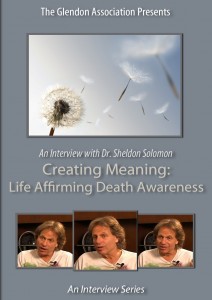Dr. Sheldon Solomon on Defenses Against Death Anxiety
Dr. Sheldon Solomon on Defenses Against Death Anxiety
Dr. Sheldon Solomon talks about common defenses against death anxiety.
LF: In your work, you focus on defenses against death anxiety that help keep it out of people’s awareness. I was wondering if you could describe those a little bit of what you see as the main defenses against death anxiety.
SS: Yeah. That’s a good question. You know, clearly, one defense is having a designated inferior. It’s an unsavory one, but we think and remember Mark Landau and Daniel Sullivan talked about this in Israel. That unfortunately, it may be the case that humans require scapegoats and hate objects. I’m going to butcher my description of their studies, but I thought that it was quite profound when they showed that people were much happier when they had an ambiguous enemy upon which they could project their dis-ease. So, that’s one way that people keep death anxiety at bay.
As you know from your own work, another way is what Kierkegaard described as tranquilizing oneself with the trivial – and I love that term. Again, back to the geniuses twisting a phrase. You can just keep yourself in a drunken stupor as a way to mitigate anxiety. And certainly, there’s no shortage of people that resort to that today or historically.
We know that watching television is a non-pharmacological stupor. Shopping appears to do the trick. And I say all these things based on our research as well as just anecdotal contention. So, each of these things, we know that death reminders make people more antagonistic toward out-group members, for example. And we know that in the aftermath, for example, of September 11, 2001 that drug and alcohol consumption went way up. Blockbuster Video had their best month ever. Gambling went way up. People bought a whole lot of guns and so that would be another way to manage death anxiety. Some people become more attached in a dogmatic sense to their religious beliefs.
But, from what I’ve said so far though, it sure sounds like everything that one does to manage death anxiety is necessarily unfortunate and malignant. And I don’t believe that to be the case. I think there are more benign forms of managing death anxiety. And I say this again, both as an anecdotal statement but also based on the research. And so the Israelis, Mariel Nickolenser and Guad Hershberger and Victor Florian, I think they’ve shown that one way to manage death anxiety is to take comfort in your relationships, particularly those with significant others. And, OK, so some people call that a defense. But, I don’t see that starting wars or depressions. You know, so, so be it if you become more attached – and this is only true for those who are securely attached, by the way. So if a securely attached person manages death anxiety by wanting to be closer to their people, I have a hard time seeing that as problematic.
I think that there’s a distinction also to be made – Allport made a distinction between intrinsic and extrinsic religiosity. And the extrinsic type would be your more, your kind of Fundamentalist, you know, god wrote the bible and if you don’t agree with every word, we’ll kill you. Then there’s the more intrinsic religion. That’s more of the hard place as opposed to the rock, which is I have these strong spiritual beliefs. Even if they are vague and inchoate, and I also see no harm in someone becoming more, you know, Ralph Waldo Emerson, Walt Whitman, Thoreau, “I love life and nature.” I see no harm in that either. Having said that though, and again in the spirit of Becker’s work and your work, I think that one could argue and would be right if you said, “Yes, there’s no harm there, but psychologically speaking, and let’s say in the spirit of, say, Yalom .I like his point in existential psychotherapy – and he’s not the only one that says this, in fact, I like the way Camus put it in one of his notebooks when he scribbled in the margin, “Come to terms with death. Thereafter, anything is possible.”
…only go so far with managing death anxiety by sweeping it under the psychological rug. Ultimately, you got to bring it out and in the Kierdegaardian sense, enroll in the school of anxiety, which cannot be accomplished, as you know, without an incredible amount of anxiety and discomfort. Because to recognize that you are finite and not particularly pleased by that prospect is to momentarily divest yourself of all of the culturally and interpersonally constructed delusions and fantasy bonds that have sustained you for your whole life. And you can’t do that without momentarily –psychologically speaking– dangling on the precipice of oblivion. But then and only then can that real kernel of who and what you are begin to emerge and that’s when we’re going to see people, myself included, at their best.
Order a DVD of Dr. Sheldon Solomon’s full interview with PsychAlive, “Creating Meaning“
 In this DVD, Dr. Sheldon Solomon addresses a variety of topics concerning how human beings can create meaningful lives in the face of death. In a lively and candid style, Dr. Solomon discusses the development of Terror Management Theory, the ways in which people form defenses against death anxiety and the concept of life affirming death awareness, arguing that we can “accept the reality of the human condition and parlay that into bringing out the best in us. ” He also addresses the societal effects of death awareness, including the social nature of human beings, the role of education and government, and the elements that make up an ideal society. Ultimately, Dr. Solomon advocates that people treat one another humanely and with a greater emphasis on compassion.
In this DVD, Dr. Sheldon Solomon addresses a variety of topics concerning how human beings can create meaningful lives in the face of death. In a lively and candid style, Dr. Solomon discusses the development of Terror Management Theory, the ways in which people form defenses against death anxiety and the concept of life affirming death awareness, arguing that we can “accept the reality of the human condition and parlay that into bringing out the best in us. ” He also addresses the societal effects of death awareness, including the social nature of human beings, the role of education and government, and the elements that make up an ideal society. Ultimately, Dr. Solomon advocates that people treat one another humanely and with a greater emphasis on compassion.
Read More from Dr. Sheldon Solomon
 Dr. Sheldon Solomon is a psychologist and the Ross Professor for Interdisciplinary Studies at Skidmore College. He is best known for developing Terror Management Theory, along with Jeff Greenberg and Tom Pyszczynski, which is concerned with how humans deal with their own sense of mortality. Dr. Solomon is the author or co-author of more than 100 articles and several books, including In the Wake of 9-11: The Psychology of Terror. He’s been featured in several films and TV documentaries as well as countless radio interviews.
Dr. Sheldon Solomon is a psychologist and the Ross Professor for Interdisciplinary Studies at Skidmore College. He is best known for developing Terror Management Theory, along with Jeff Greenberg and Tom Pyszczynski, which is concerned with how humans deal with their own sense of mortality. Dr. Solomon is the author or co-author of more than 100 articles and several books, including In the Wake of 9-11: The Psychology of Terror. He’s been featured in several films and TV documentaries as well as countless radio interviews.









Leave a Reply
You must be logged in to post a comment.